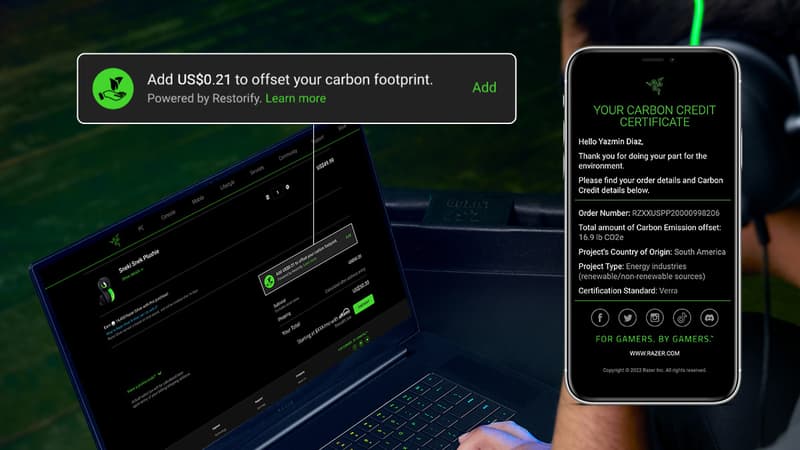Buying a keyboard, a computer or any product online, many times from the other side of the world, has a cost to the planet and also to the wallet. But it is above all the carbon footprint that skyrockets. The awareness of companies and consumers is now very real, and everyone wants to go there with their good gesture, their good deed. But without knowing, most of the time, what it really is.
On the occasion of COP27 organized last week in Egypt, Razer, the world specialist in gaming accessories, presented Restorify. This time, there is no product in sight, but an e-commerce solution that wants to offer better carbon traceability of your online purchases.
Offset your carbon footprint through identified projects
Restorify is based on the idea of carbon offsetting to help reduce emissions into the atmosphere. This usually results in carbon credits expressed in metric tons that are difficult to divide. And therefore it is difficult to design an offset for purchases based on excessively large carbon credits.
First released on the Razer site, the Restorify tool takes multiple aspects into account, with the goal of dividing up carbon credits and getting small volumes to allow consumers to offset their own purchases.
And Razer has approached a number of players to build a pipeline of carbon credit projects, trying to avoid greenwashing and simply planting trees, and partners to back it up, including GoNetZero, an energy solutions provider, ESGpedia, a specialist in traceability of carbon credits that will list buyers. compensation, and even the Amazon Web Service cloud computing platform.
Encourage Amazon and other commercial sites to do the same
To participate in the collective effort to achieve carbon neutrality in the world by 2050, the Singapore company wants to act with full transparency while empowering consumers and manufacturers alike. At checkout, buyers will be able to measure and view the carbon footprint of the product they added. For an additional sum, calculated on the basis set by the OECD ($147 per tonne of CO2 equivalent), they will then have the possibility to offset everything by buying carbon offsets previously withdrawn from verified carbon registries.
Once the purchase has been validated, the consumer will obtain a certificate that will allow carbon credits to be tracked to find out what cause they have served. A way to be transparent about the actual compensation applied. This will indicate the total amount of carbon emissions offset by the purchase, the type of project supported, and its location. But it doesn’t stop at payment. Projects will be subject to regular monitoring and reporting so that the buyer is informed of their use.
However, the idea is not to stick with your tool and your good conscience for your one place, but to start a movement. If Razer has been multiplying projects and actions for several years to accelerate its decarbonization process (limitation of packaging, ecolabel obtained for several of its mice and keyboards, limitation of emissions throughout the production and shipping chain, recycling, etc.), the El The American-Asian group also wants to make other companies aware of the importance of better managing their carbon footprint and promoting responsible consumption.
Restorify thus offers a product emissions calculator that is made available to other sites free of charge so that they can estimate their carbon footprint in real time and throughout the entire life cycle of a product (material supply, manufacturing, transportation, use, disposal). And the group hopes to attract commercial sites such as eBay or Amazon, but also its 50,000 associated merchants from the Razer Fintech network, its financial arm in charge of digital payment and at the origin of the project.
Source: BFM TV


